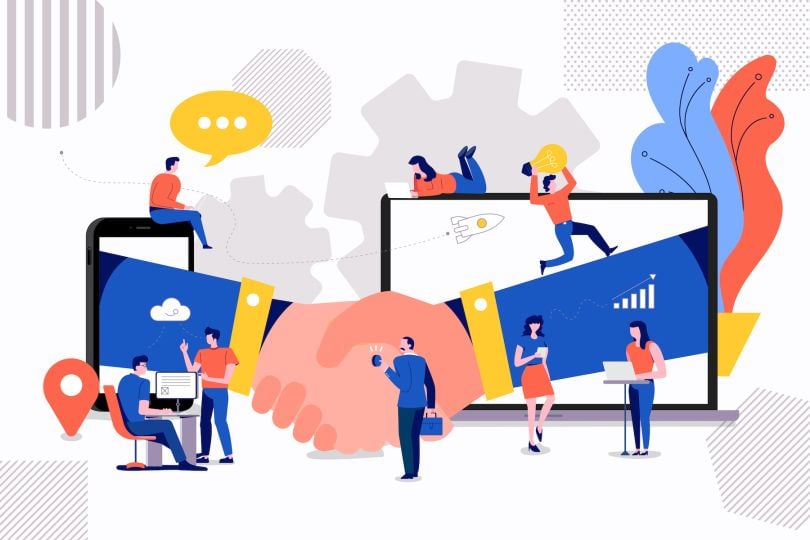It was only a few months ago that ShoppingGives’ sales team was in the process of ramping up its outbound sales process. Pitches were focused on how a retailer could make a difference by giving back through its platform and the growth integrating those services would provide. After all, the economy was thriving.
A lot has changed since then.
The COVID-19 pandemic and its economic aftermath means that sales strategies that worked just a few months ago have quickly become outdated. Customer priorities have shifted from growth to survival. As a result, one of the most important steps a sales team can take is to build trust and empathy with its customers, said Todd Caponi, sales coach and author of the book The Transparency Sale.
“Trust is everything,” Caponi said. “Buyers still buy when things are going wrong, it’s just that they prioritize.”
While trust is a nebulous concept, there are a few concrete steps a salesperson can take to be there for their customers and still close deals.
“Trust is everything. Buyers still buy when things are going wrong, it’s just that they prioritize.”
At ShoppingGives, the sales team paused its cold calling efforts to give its customers space. For them, building trust has meant focusing on inbound leads, which have increased 60 percent, and slowing down calls to understand the needs of the customers, said Ronny Sage, the company’s CEO.
“We’re bringing the education of the market upfront in the sales conversation much more because customers are looking to create immediate impact now,” Sage said.
But there are other steps salespeople can take to build trust, from adopting a more personalized sales approach, to taking time to consult customers and restructuring contracts to reflect the new economic realities. We spoke with Caponi, along with sales teams at ShoppingGives and the restaurant delivery management platform Ordermark about how salespeople can build trust during a downturn.
Exercises for Building Trust With Customers
- Focus your pitch on where you can provide value to customers. In an uncertain economy, this will help the customer make an informed decision about your product.
- Spend more time in the discovery phase to make sure you’re addressing a customer’s needs. Doing so can be the difference between a long-term partner and a frustrated buyer.
- Provide research, webinars or support to customers, even if it doesn’t lead to a sale. Supporting customers outside of sales builds up trust and can lead to deals down the line.
- Practice transparent negotiation.Eliminate auto-renewal clauses and be upfront about pricing and opportunities for discounts.

Know Where You Can Provide Value to a Customer — and Where You Can’t
Whenever there’s economic uncertainty, one of the most common questions Caponi receives from sales teams is whether they should stop selling.
The short answer — no. There are opportunities to build relationships with customers and grow the user base, but it requires knowing exactly where the product can help the customer and tailoring the messaging to that, Caponi said. However, because customers are reducing runway costs and risk, it’s important to tailor your conversations to address those issues.
“Your relationship can be built up quite a bit in times like this if you’re personalized and valuable to them in the way that’s relevant to them,” Caponi said. “But it can erode [trust] twice as hard in times like this if you’re tone-deaf.”
At Ordermark, the sales team has pivoted its sales approach to spend more time in the discovery phase with customers. After the initial scare caused customers to scramble and readjust to the new social landscape, the company has seen an influx in restaurants reaching out looking to adopt its platform.
“We understand the value that we can provide, but we have to make sure the restaurant understands it too. And it starts with a lot of information gathering.”
To make sure restaurants are prepared for that transition, the team has spent more time getting to know the restaurants and making sure they’re prepared for delivery, said Jimmy Peters, Ordermark’s head of sales. For salespeople, that means learning the customer’s pain points, understanding what preparation they’ve undertaken to adopt the software, and explaining clearly where the product can and can’t help.
Having those conversations early on has been critical to establishing a sustainable relationship, Peters said.
“We understand the value that we can provide, but we have to make sure the restaurant understands it too,” Peters said. “And it starts with a lot of information gathering.”
If a customer isn’t prepared, don’t push the sale for the short-term boost.
Helping Customers Outside of a Sale Can Be Just as Important as Closing a Deal
Not every prospecting call needs to lead to a sale.
In times like these, it’s just as important to be there for customers by providing them with research or data that can help them — no strings attached, Caponi said. Sometimes, it means listening to their needs and connecting them to someone that can help solve a particular issue they’re experiencing.
ShoppingGives has adapted its sales strategy to provide more education to its customers about what it takes to set up a donation plan, Sage said. Members of the sales team will send research on the impact giving back can have during financial recessions and catastrophes, episodes from their podcast, Impact Exchange, and what steps the customer should complete before going from ShoppingGives’ free Shopify package to a paid one.
“If I just keep giving, there might be opportunities that come as a result of that because I’m building a brand.”
The strategy lets customers know how ShoppingGives can support them when they’re ready and clears up any confusion they may have about giving back before the first call, Sage said.
“What we were selling and explaining our value of it just got expedited because everyone was asking for this now, and they need to know this information,” Sage said. “So, it became about how we could create more educational content to inform them of the right way of doing (donations) and saying we’re here to support you in the process.”
For Caponi, it’s meant sending sales coaching articles he’s written and hosting webinars for free. Taking the time to consult customers can create a lasting trust that will inspire the prospective customer to return in the future, he said.
“If I just keep giving, there might be opportunities that come as a result of that because I’m building a brand,” Caponi said. “But when things open up in the back end, I’m also much better positioned. I know that’s hard for companies ... but don’t risk the long term for a short-term bump.”

Be Upfront About Your Pricing and Continue Supporting the Customer After the Deal
As the economy started to shift, one of the most common issues ShoppingGives business development rep Savanah White heard about from prospects was about their budgets.
A lot of retailers wanted to give back, she said, but they were on a spending freeze or had their budgets cut. To address this issue, White spends more time with customers discussing payment options and making sure the plan is tailored to them. The company also made its pricing publicly available, which enabled White to have more transparent conversations about the product.
“We recently made our pricing page public so it doesn’t seem like a secret when we’re getting on the phone with people,” White said. “Then we can figure out which levers we can pull on those pricing packages that make the most sense for our customers.”
That clarity in price points is even more important for sales teams. It can be easy to lose the trust with a customer by misleading them in the buying process or burying auto-renewal terms in the contract, Caponi said.
“Just be mindful that these are real people on the other side.”
To build trust during the closing process, it’s important to be clear about the pricing and about exactly what your company would need in order to give a discount. For example, if you care about volume, speedier payment and length of commitment, tell the customer that. They can take that into consideration and decide for themselves what the best deal is for them, Caponi said.
“Transparent negotiating is a way to build trust right through the goal line,” Caponi said. “If you do it right, where you lay the foundation when you first talk price and make sure it’s clear in the proposal, the negotiation becomes easy because customers will basically negotiate their own deal.”
But the relationship doesn’t end there. Once a deal is complete, Ordermark’s sales team will frequently check in with customers to see how they’re doing. Sometimes, the message will be to celebrate high-delivery sales, or to offer advice if they’re struggling. Those conversations give customers the confidence that they’re being supported throughout their time with the company, Peters said.
When it comes down to it, developing personal connections is what salespeople do best. During a time of both personal and economic uncertainty, taking a little more time to connect isn’t just good for business — it’s good for everyone.
“Just be mindful that these are real people on the other side,” White said. “Make sure you’re keeping track of what’s been said and what people’s priorities are so that when conversations happen, you can address those things, whether they’re positive or negative, so that you’re coming into that conversation as a real person and not just a vendor partner.”




